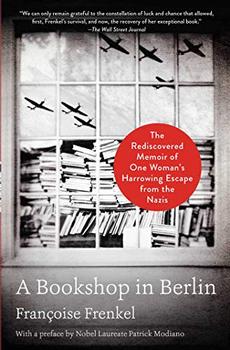Summary | Excerpt | Reviews | Beyond the Book | Readalikes | Genres & Themes | Author Bio

The Rediscovered Memoir of One Woman's Harrowing Escape from the Nazis
by Francoise FrenkelChapter 2
On the Eve of WWII:
Three Days Before the Bombing of Paris
In France, nobody believed war was approaching. I breathed in the air of the capital. Very swiftly, I allowed myself to be won over by the general feeling of confidence. I found myself hopeful of an imminent departure and of being reunited with my family.
Throughout these days of heightened crisis, Paris retained its usual outward appearance: movement, color, vitality.
People were discussing the situation on the café terraces, on street corners. In the metro, they would read their neighbor's newspaper over their shoulder; the need to communicate and, if possible, to discover any fresh details from somebody who was perhaps better informed, spurred people to speak to anybody they encountered, to stop in the street to listen, to look, to discuss matters endlessly.
The general public would wait outside the printers' to buy the papers, ink still wet from the presses. The crowd would jostle to snatch up any new issue; news vendors on their bicycles seemed to sprout wings as they flew down the street. People queued up in front of the newsstands well before the arrival of the newspaper couriers. Some would take several papers, of differing opinion, scour them feverishly on the spot, then pass them on to other readers.
At times the mainstream broadsheets would reassure the population; at other times they encouraged people to prepare for the inevitable.
Radios blared relentlessly in homes, courtyards, squares, offices, restaurants, and cafés. It was impossible to escape their hold. Their rasping tones permeated everywhere, even into theaters, and into the intervals of classical music concerts.
People listened haphazardly to bulletins in any language. A true tower of Babel! Some made certain to wake up in the middle of the night to listen to American broadcasts. It was an obsession! Nervous tension grew to indescribable levels in those days.
Utterly consumed by a fervent desire for peace, the French people were hoping. The notorious phrase: Last year, too, we expected the worst and yet everything worked out ... circulated from mouth to mouth, like the chorus of a popular song.
Which is why, when hostilities broke out, the whole of France was plunged into dark despair.
For me, it was heartrendingly distressing.
Only then did I truly comprehend the distance separating me from my mother. I saw myself remaining far from her and all my loved ones for the duration of the war, that is for an eternity of torment and worry about them.
The German army was advancing, trampling over Poland and taking control. I anxiously followed the enemy's lightning progress on the map ...
The wireless relentlessly reported the horrifying details of carnage, battles, bombardment, devastation, and civilian massacres. Bulletins were broadcast at mealtimes and one had to get used to eating, drinking, chewing, swallowing, all the while listening to the bloody and disastrous stories in the news. Horror made itself at home in everyday life.
From one day to the next, Paris had fallen strangely silent. And so began for France that curious military lull, "the Phoney War."
It was then the press initiated an extensive campaign against what was known as "the Fifth Column," which had been growing for years. Keen for a diversion, the general public became obsessed with these sensational revelations.
The prefecture of police instituted "extraordinary measures" of a broad-reaching nature, resolving to conduct a census of all foreigners and to review their status.
These measures, drawn up without any forethought, were implemented on the spot. Police stations, hotel management, landlords, concierges, all those who employed foreigners were asked to ensure compliance with the new regulations.
The whole population started to keep an eye out for "suspects." Overnight, thousands of foreigners took up position in front of the prefecture of police, forming a line that stretched past the Quai aux Fleurs and reached all the way to Boulevard Saint-Michel.
From A Bookshop in Berlin: The Rediscovered Memoir of One Woman's Harrowing Escape from the Nazis by Françoise Frenkel. Reprinted by permission of Atria, a Division of Simon & Schuster, Inc. Copyright © 2019 by Françoise Frenkel.
Your guide toexceptional books
BookBrowse seeks out and recommends the best in contemporary fiction and nonfiction—books that not only engage and entertain but also deepen our understanding of ourselves and the world around us.